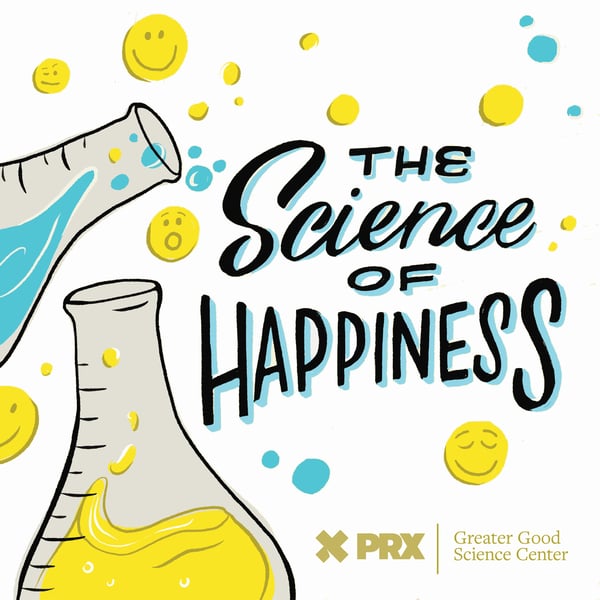Happiness Break: A Mindful Breath Meditation, with Dacher Keltner
The Science of Happiness
PRX and Greater Good Science Center
4.4 • 1.9K Ratings
🗓️ 27 July 2023
⏱️ 6 minutes
🧾️ Download transcript
Summary
Mindful breathing exercises are a simple, effective, and fast way to shift our mindset and improve physical and mental well-being when practiced regularly.
Link to episode transcript: https://tinyurl.com/mpt4rr5x
How to Do This Practice:
Find a comfortable position to start the practice, maintain a good posture and close your eyes.
Take a deep breath in for a count of four. Hold that breath, feeling it in your lungs and body for another count of four. Push the air outwards, exhaling for a count of six.
Repeat this exercise as many times as you would like.
Today’s Happiness Break host:
Dacher Keltner is the host of the award-winning podcast, The Science of Happiness and is a co-instructor of the GGSC’s popular online course of the same name. He’s also the founding director of the Greater Good Science Center and a professor of psychology at the UC, Berkeley.
Check out Dacher’s most recent book, Awe: The New Science of Everyday Wonder and How It Can Transform Your Life: https://tinyurl.com/4j4hcvyt
More resources from The Greater Good Science Center:
What Focusing on the Breath Does to Your Brain: https://tinyurl.com/3u8h53pw
Is the Way You Breathe Making You Anxious?: https://tinyurl.com/mryr2jup
A Five-Minute Breathing Exercise for Anxiety and Mood: https://tinyurl.com/3ve66u2k
How Four Deep Breaths Can Help Kids Calm Down: https://tinyurl.com/5xr2sb99
What does mindful breathing do for you? Email us at [email protected] or use the hashtag #happinesspod.
Find us on Spotify: https://tinyurl.com/taub93tp
Help us share Happiness Break! Rate us on Spotify and copy and share this link: https://tinyurl.com/taub93tp
We're living through a mental health crisis. Between the stress, anxiety, depression, loneliness, burnout — we all could use a break to feel better. That's where Happiness Break comes in. In each biweekly podcast episode, instructors guide you through research-backed practices and meditations that you can do in real-time. These relaxing and uplifting practices have been shown in a lab to help you cultivate calm, compassion, connection, mindfulness, and more — what the latest science says will directly support your well-being. All in less than ten minutes. A little break in your day.
Transcript
Click on a timestamp to play from that location
| 0:00.0 | Welcome to Happiness Break, our series on the Science of Happiness, where we take a break |
| 0:07.0 | to take care of our own well-being. |
| 0:09.9 | For the past 25 years, I've studied the evolution and the neuroscience of what makes us happy, |
| 0:14.9 | and I've taught it to hundreds of thousands of people. |
| 0:18.1 | And what I've learned is that there are simple actions and practices that don't take a lot |
| 0:22.3 | of time that can bring us greater strength, closeness in our relationships, and help us |
| 0:27.6 | handle the trials and tribulations of life. |
| 0:33.8 | One of the simplest and most effective pathways to well-being is mindful breathing. |
| 0:41.3 | Simply breathing deeply and more slowly activates the vagus nerve, which helps with heart |
| 0:46.1 | health and being open to other people. |
| 0:49.3 | This deep-in breathing also decreases the activation of the amygdala and calms down chronic stress. |
| 0:56.0 | If in breathing right before bed helps us sleep better, it can help us concentrate better. |
| 1:00.1 | It helps us regulate the stresses of daily living. |
| 1:03.3 | So today, we're going to do a slow mindful breathing exercise. |
| 1:08.1 | What I'm going to do is lead us through a breathing practice that has been widely applied |
| 1:12.8 | in different scientific tests. |
| 1:14.9 | You breathe in to account of four, you hold that breath to account of four, and then |
| 1:19.2 | you breathe out deepening the exhalation to account of six. |
| 1:25.8 | Let's begin. |
| 1:39.3 | Find a comfortable position sitting or standing. |
| 1:43.2 | Close your eyes if you feel safe, and put your hands in a place where they're relaxed |
| 1:47.7 | either on your knees if you're sitting or by your sides if you're standing. |
... |
Please login to see the full transcript.
Disclaimer: The podcast and artwork embedded on this page are from PRX and Greater Good Science Center, and are the property of its owner and not affiliated with or endorsed by Tapesearch.
Generated transcripts are the property of PRX and Greater Good Science Center and are distributed freely under the Fair Use doctrine. Transcripts generated by Tapesearch are not guaranteed to be accurate.
Copyright © Tapesearch 2025.

